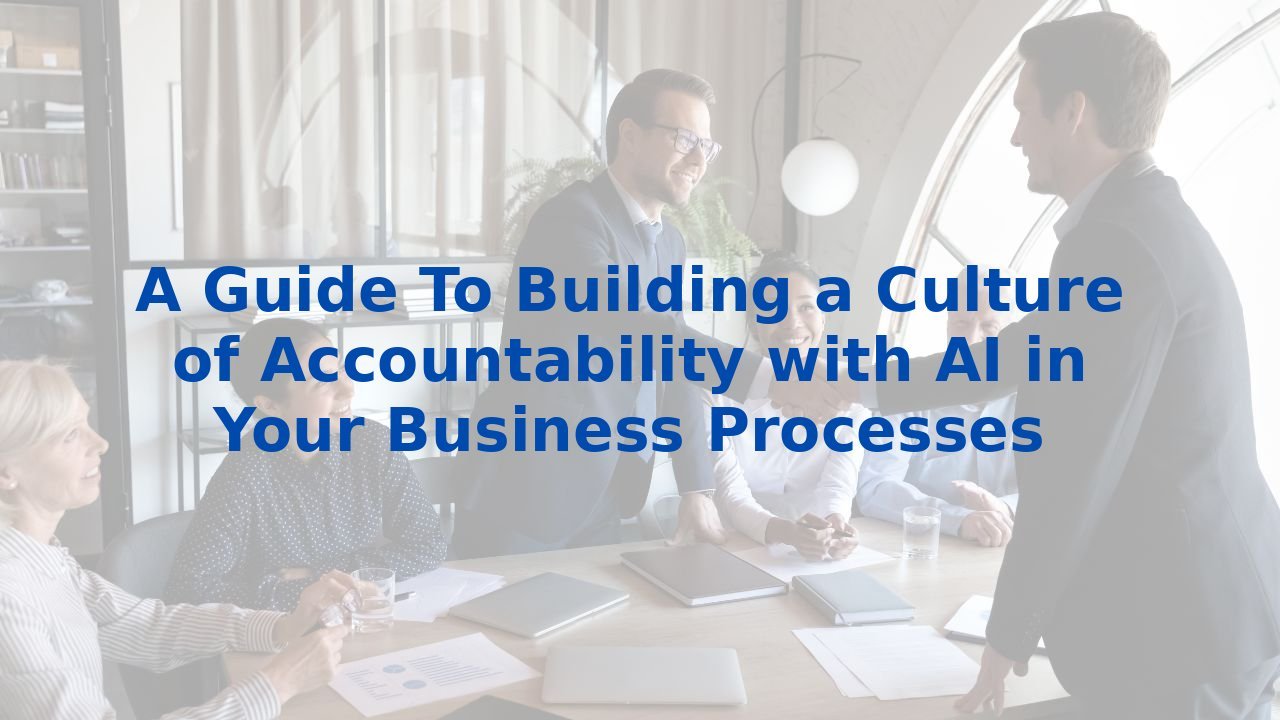A Guide To Building a Culture of Accountability with AI in Your Business Processes
A Guide To Building a Culture of Accountability with AI in Your Business Processes
In the dynamic landscape of modern business, where speed and efficiency are non-negotiable, the concept of accountability takes on heightened significance. This guide aims to show you how to integrate Artificial Intelligence (AI) into your organization’s processes, thereby creating a culture of accountability while improving efficiency.
The Role of AI in Business Process Management
AI has swiftly transformed business process management, providing robust solutions that not only enhance productivity but also augment accountability by illuminating workflow intricacies. Let’s explore key areas where AI plays a pivotal role:
- Process Discovery: Leveraging advanced techniques such as process mining and natural language processing, AI can unearth the underlying frameworks of existing processes. By pinpointing inefficiencies and bottlenecks, businesses can proactively address issues before they escalate.
- Process Mapping: The power of AI allows organizations to analyze real-time data, creating dynamic process maps that reflect current workflows. This adaptability ensures that processes remain aligned with overarching business objectives.
- Process Automation: Automating mundane, repetitive tasks through AI bots liberates human talent for more strategic initiatives. From data entry to routine administration, AI efficiently handles these activities, mitigating error risks and freeing valuable resources.
- Process Management: AI’s continuous monitoring capabilities ensure that processes remain on track. By utilizing historical data to preempt potential disruptions, organizations can foster a culture of accountability grounded in proactive problem-solving.
- Process Improvement: AI doesn’t just highlight the status quo; it drives sustainable improvements. Through data-driven insights and predictive modeling, organizations can undertake meaningful changes aligned with their growth objectives.
Enhancing Efficiency with AI
The integration of AI in business fundamentally reshapes organizational efficiency. Here’s how this technology becomes a catalyst for better performance:
- Automating Routine Tasks: By alleviating the burden of routine tasks, AI empowers employees to focus on higher-value activities. This minimizes time spent on repetitive work, allowing for a more engaged workforce.
- Improving Decision Making: AI enhances decision-making capabilities by revealing trends and predicting outcomes. This data-driven approach enables leaders to make informed, strategic choices that propel the organization forward.
- Enhancing Customer Service: In the realm of customer support, AI can sift through customer feedback, extracting key insights. Chatbots streamline inquiries, providing immediate responses while elevating the overall customer experience.
- Optimizing Sales Processes: For sales teams, AI can pinpoint effective channels and highlight upsell opportunities. This not only facilitates more efficient outreach but also allows human agents to enhance their strategic interactions with customers.
The Benefits of Training Employees for AI
The true potential of AI finds its realization not just in the technology itself but in the hands of well-trained employees. Proper training fosters a symbiotic relationship between people and machines, yielding significant benefits:
- Improved Understanding: Training arms employees with a deeper understanding of how AI operates within their workflows. This improves teamwork and collaboration, crucial for a culture of accountability.
- Enhanced Skills: Equipping your workforce with skills related to AI tools and processes can lead to a more capable and agile organization, adept at navigating the complexities of the contemporary business landscape.
- Increased Efficiency: Well-trained employees can leverage AI’s capabilities to automate tasks effectively, resulting in higher productivity and a sharper focus on strategic objectives.
Conclusion
Fostering a culture of accountability in your business is not merely about enforcing rules; it's about creating a framework where efficiency thrives, bolstered by AI. By weaving this technology into your business processes, you not only streamline operations but also lay the groundwork for a culture where tasks are executed with precision and outcomes are pursued with intent.
Ultimately, embracing AI represents a profound shift in the way organizations perceive their processes and relationships with their workforce. It’s not a mere addition of technology, but a comprehensive transformation. By investing in AI and the training of your employees, you can cultivate a culture where accountability is inherent and commitments are upheld, driving your organization toward sustainable growth.
For organizations keen on embracing AI, it's vital to begin with solid foundations. With the right training initiatives, your team can unlock the immense power of AI, navigating the complexities of today’s business environment while fostering a shared sense of responsibility and purpose.



